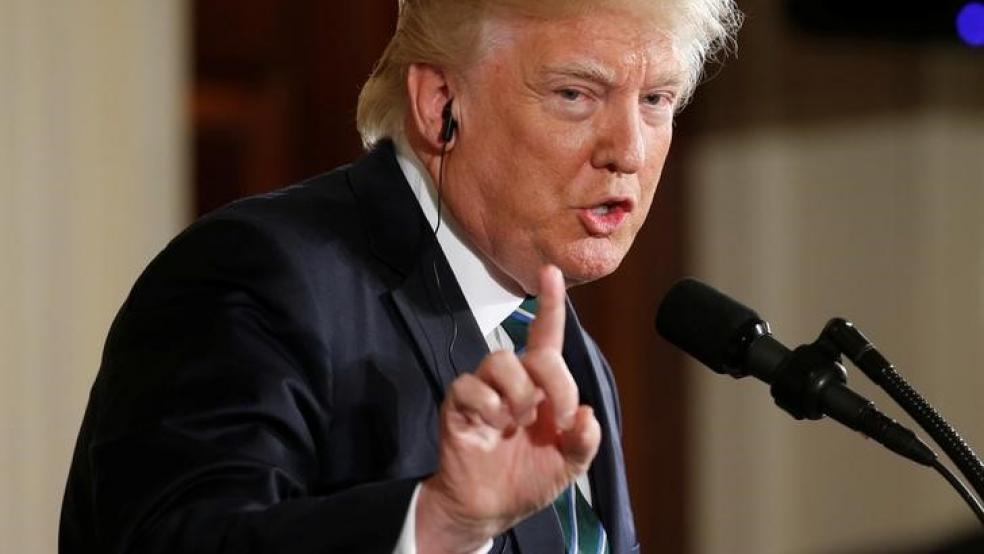In one of his few on-the-record interactions with the news media since being elected president, Donald Trump sat for an hour on Tuesday with editors and reporters from The New York Times and took questions on a variety of topics. In the course of the interview, he reversed himself or backtracked on numerous subjects, but appears to have stood firm on his plan to retain his global business interests during his term, despite the appearance of conflicts of interest.
Trump’s meeting with the Times almost didn’t happen. He tweeted early this morning that the newspaper had changed the agreed-upon ground rules and cancelled the interview. However, it appears that Trump was given bad information by his staff -- New York Times reporter Maggie Haberman said sources named incoming White House Chief of Staff Reince Priebus. The paper had not changed the terms of the agreements, and Trump finally turned up at the paper’s headquarters in the early afternoon.
Related: Trump Says Nobody but the Media Cares About Conflicts of Interest
Trump, who on Monday reportedly spent the better part of an hour complaining to televisions news anchors and executives about how they covered his campaign, also carped about the Times’ coverage during the interview, but apparently took only a few minutes at the beginning of the meeting to criticize the paper.
During the course of the interview, which the Times live-blogged and which several reporters live-tweeted, Trump made a number of statements that will probably come as a surprise to many of his supporters. Perhaps the most surprising is that, after months of leading crowds in the chant “Lock her up! Lock her up!” at his campaign rallies, Trump said he actually has no interest in pursuing a criminal investigation of defeated Democratic presidential candidate Hillary Clinton.
“It’s just not something that I feel very strongly about,” he said when he was asked about it, adding that he thought prosecuting the woman who he repeatedly accused of running a “criminal enterprise” would be too divisive for the country.
Trump, who has in the past referred to climate change as a “hoax” perpetrated by the Chinese to harm U.S. competitiveness, signaled some openness to working on the issue. Asked if he would withdraw the U.S. from the recent global climate agreement negotiated in Paris, he said, “I’m looking at it very closely. I have an open mind to it.”
Related: Trump, on YouTube, Delivers a Message to the Public — and the Media
Trump also expressed openness to the possibility that global warming might be caused by human activity, though he said he wasn’t sure of the size of the man-made change. He said that he would consider the costs of compliance with new climate regulations to U.S. businesses.
Facing criticism for his campaign’s association with the “alt-right” movement -- which is associated with white nationalism, anti-Semitism and racism -- Trump was asked about a gathering of white nationalists in Washington over the weekend. Among other things, the speakers praised Trump and his appointments, while offering Nazi salutes and declaring that the U.S. was founded for the “white race.”
“I disavow and condemn them,” Trump said. However, at the same time, he defended his appointment of former Breitbart News executive chairman Steve Bannon as chief White House strategist and senior advisor.
Bannon, who once described the Breitbart website as the “platform for the alt-right,” has insisted that while he is an “economic nationalist,” he isn’t a white nationalist.
Related: 3 Reasons Trump Could Put Cruz on the Supreme Court
Asked about Bannon, Trump said, “If I thought he was a racist or alt-right or any of the things, the terms we could use, I wouldn't even think about hiring him.”
Trump supporters will likely also be surprised to learn that Trump appears to be developing an affinity for President Obama, whom he spent months savaging on the campaign trail. Obama, he said, “has said very nice things” about him. Trump repeated that a 90-minute meeting with Obama last week had been “great” and that “I liked him a lot.”
Trump also backpedaled on an earlier promise to loosen libel laws in order to make it easier to sue the news media for stories he didn’t like. The change may have come because someone in the campaign explained that libel law exists at the state level but not at the federal level, and therefore the president has no influence over it.
However, Trump painted a different picture. Someone, he said, told him, “‘You know, you might be sued a lot more.’ I said, ‘You know, I hadn’t thought of that.’"
Related: The Latest Republican Trick to Roll Back Obama’s Rules
When he discussed his business holdings, Trump’s claim that “The law's totally on my side, the president can't have a conflict of interest,” seemed to some observers on social media perilously close to Richard Nixon’s insistence that “when the president does it, that means it’s not illegal.”
Trump is partially right, in that statutory conflict of interest laws do not apply to the president and vice president. However, both are still bound by the “emoluments clause” of the Constitution, which bars public officials from accepting payments from foreign governments. Ethics experts say that it is the emoluments clause that Trump is most likely to run afoul of.





